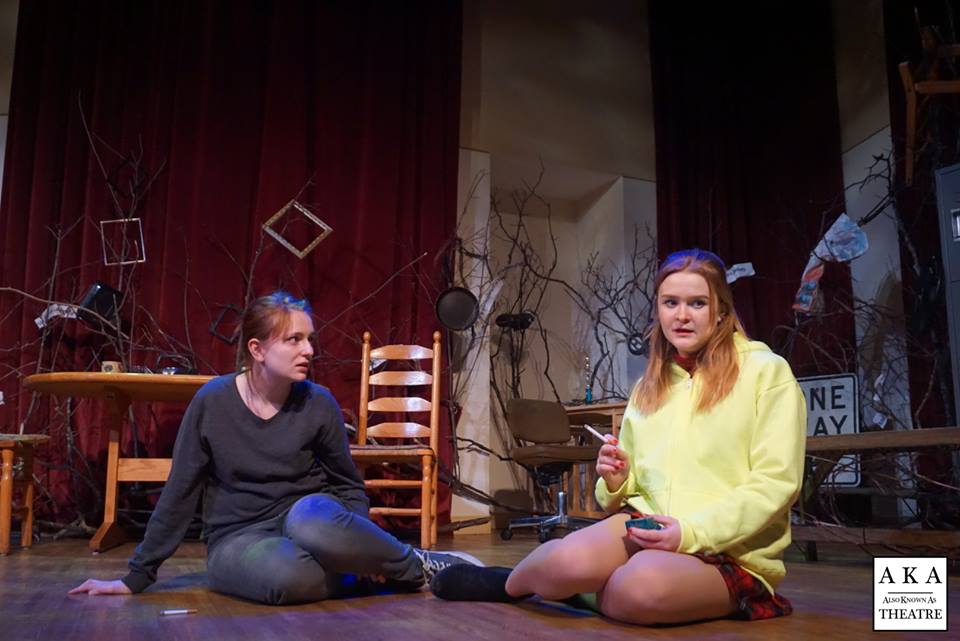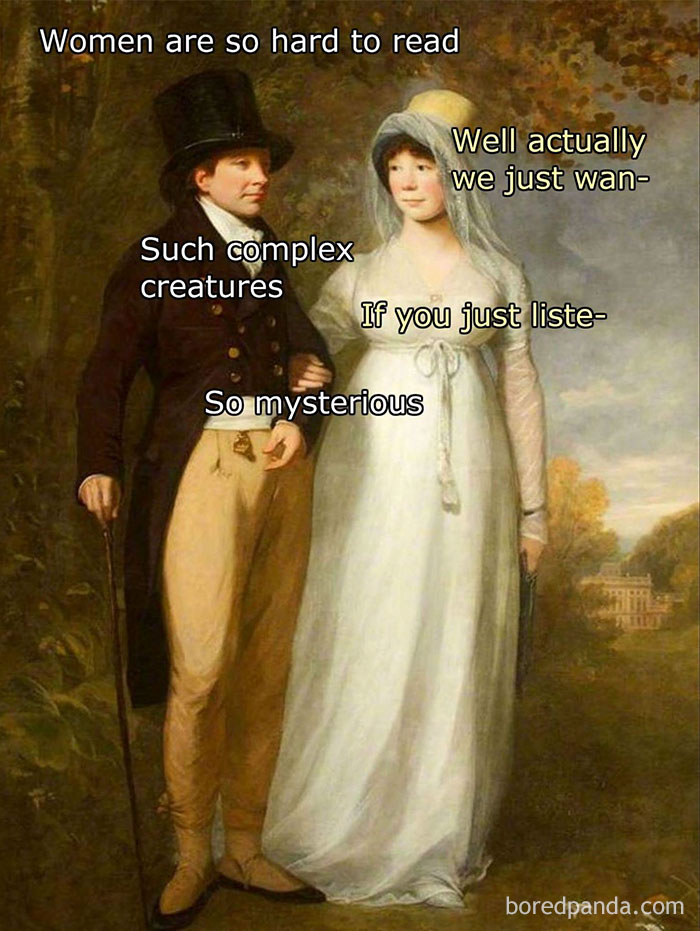
Photo by Tenneh Sillah. With Kira Compton and Branwyn Ritchie.
Presented by Also Known As Theatre
By Stephen Spotswood
Directed by Kelly Smith
Movement design by Jessica Stout Malone
Nov. 16 – Dec. 2, 2018
Stanford Calderwood Pavilion
Boston Center for the Arts
Boston, MA
AKAT on Facebook
Critique by Kitty Drexel
(Boston, MA) In the Forest, She Grew Fangs twists the Little Red Riding Hood cautionary tale about the dangers of strange men into a different cautionary tale about the dangers of female mental health. Fans of horror theatre may find a lot to enjoy in this production. Intersectional feminists might not. ITFSGF explores the modern young woman’s psyche as she comes of age. It does so through the lens of bullying culture and a little light stabbing.
We are introduced to four characters who circle each other until they strike. Lucy (Kira Compton), Jenny (Branwyn Ritchie), Hunter (Dylan C. Wack), and Grandma Ruth (Karen Dervin) live in the smallest of small towns somewhere remote near a wild forest. Jenny is a new girl from a big city and the most exciting thing Lucy and Hunter have seen. Lucy can’t tell if she wants to be Jenny or to fuck Jenny. Hunter just wants to fuck her. Ruth, like most guardians, is completely clueless to the meanderings of teenagers.

Women are people, not creatures.
Watching ITFSHEF, I was reminded of infamous classic art meme, “Women are so hard to read.” Stephen Spotswood does not know what young women want. This play has a run time of 100 minutes but in that time it doesn’t communicate a clear message of intent. The audience is given a lot of information about high school’s difficulty, the trauma of undiagnosed psychosis, and the impatience of youthful horniness, but none of that collects into a concentrated message of what ITFSGF is about. That’s 100 minutes too long. An audience needs to leave a play knowing why a playwright demands their attention. If you ask them what they want, young women will not take 100 minutes to tell you. Whether or not these wants are understood is up to the adult, male playwright.
AKA’s cast and creative crew did a commendable job considering the script is as awkward as a teenage boy removing a front-closing bra for the first time. The cast may need to speak up so the last rows can hear them, yet their characters are believable. Compton plays Lucy with tenacious angst. Her social anxiety, generalized anxiety, and obsession with the unusual are relatable to anyone <critic points to self> who lived on the outskirts of high school’s cliques. Ritchie epitomizes the aloof “cool girl” who hides a painful personal life. She gives emotional depth to the character Jenny, and donates great energy to the cast when its collective energies ran low. Dervin is a sensitive, caring Grandma Ruth. It’s unfortunate that the role isn’t larger so Dervin could play with a character arc.
Wack plays Hunter with normalized creep. It’s the kind of socially acceptable, boys-will-be-boys creepitude that parents explain away up until there’s a rape. Hunter is just charismatic enough that a girl like Lucy would be accused of selfishness for getting in the way of Hunter’s prospects.
The colorful dream sequences were painted like a fairy tale by lighting designer Samuel J. Biondolillo. The movement coaching by Jessica Scout Malone brought to life the underwater choreography. Biondolillo and Malone couldn’t save the dream sequences from the writing. Dream sequences are intended to reveal the psychological workings of the characters dreaming them. Monologues do the same. That ITFSGF is both monologue heavy and gifted with multiple dream sequences means that the audience gets nothing but an advanced understanding of the characters’ turmoil or musings. Spotswood tells us everything. We aren’t shown enough.
In the Forest, She Grew Fangs was a 2013 National Playwrights Conference finalist. The play has further to go before its finished. We know so much more about women now than Stephen King did when he wrote Carrie. No one should fear the burgeoning sexualities of young women. Girls aren’t ineffable mysteries wrapped in enigmas created to confuse boys. They are people – albeit, shorter, hormonal, underestimated people who lack life experience but people all the same. They aren’t going to “Kylo Ren” a guy’s face because the hot chick told them to take a stand. There’s always a build up.
